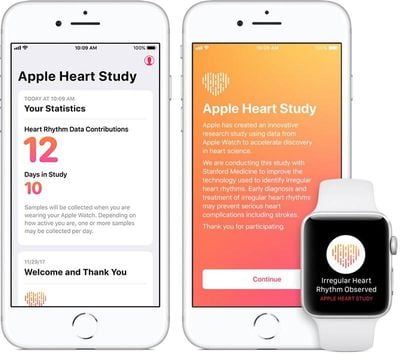Stanford Medicine today published results from the Apple Heart Study that kicked off in 2017, marking the third time data from the study has been shared (via Reuters and CNBC).
The aim of the study, conducted by Stanford and Apple, was to determine whether the Apple Watch is able to detect atrial fibrillation, which can be an indicator of serious heart health problems. Researchers wanted to determine how well the Apple Watch worked and whether it was safe to use.

A total of 419,297 people in the United States participated in the study, and 0.52 percent of participants (2,161 people) received an irregular heart rhythm notification over 117 days of monitoring. People who received a notification were sent ECG patches to further monitor for heart problems, but quite a few of those went unreturned.
Of the 450 people who returned the patches with data that could be analyzed, atrial fibrillation was present in 34 percent overall and 35 percent of participants age 65 or older. Of those who had an irregular reading and returned a patch, 84 percent of subsequent notifications were determined to be atrial fibrillation.
Among participants who were notified of an irregular pulse, the positive predictive value was 0.84 (95% CI, 0.76 to 0.92) for observing atrial fibrillation on the ECG simultaneously with a subsequent irregular pulse notification and 0.71 (97.5% CI, 0.69 to 0.74) for observing atrial fibrillation on the ECG simultaneously with a subsequent irregular tachogram. Of 1376 notified participants who returned a 90-day survey, 57% contacted health care providers outside the study. There were no reports of serious app-related adverse events.
According to researchers, the low number of warnings in the study indicates that the device does not cause an excess of false notifications in healthy people who wear the watch.
In some cases, atrial fibrillation detected by the Apple Watch was in the early stages of development, and it didn't happen frequently enough for the patch testing to detect it, something that was more prevalent in younger participants.
The study did ultimately determine that the Apple Watch can detect atrial fibrillation. Stanford cardiologist and co-author of the study Dr. Mintu Turakhia said that the trial was overall a success, especially when it came to determining how many people are going to get heart-related notifications from Apple Watch and what those types of notifications mean for patients, doctors, insurers, and more.
Dr. Daniel Cantillon, a Cleveland cardiologist who was not involved, told Reuters that the technology was promising, but more than half of participants were under 40, a group at low risk for atrial fibrillation, leading to concerns about scaring healthy people.
Separately, a New York cardiologist told CNBC that there's a risk of the Apple Watch finding young people who have early signs of atrial fibrillation that the medical community doesn't know how to treat. "We just don't understand atrial fibrillation well in the 35-year-old, otherwise healthy person," he said.
Wessler treats patients who have visited him based on data gathered from the Apple Watch, and he expects those kind of visits to pick up in the future. Should Apple's research continue, Wessler believes it's important to find the right population that's most at risk to use these tools rather than delivering them to a mainstream audience.
The study was overall beneficial, demonstrating the potential for large-scale studies that use a variety of technologies to monitor patients remotely without requiring on-site visits. Since this study kicked off in 2017, it did not use the new Apple Watch models that are able to take ECG readings, instead relying on the standard heart rate sensor.
The full Apple Heart Study published by Stanford Medicine can be read in The New England Journal of Medicine.




















